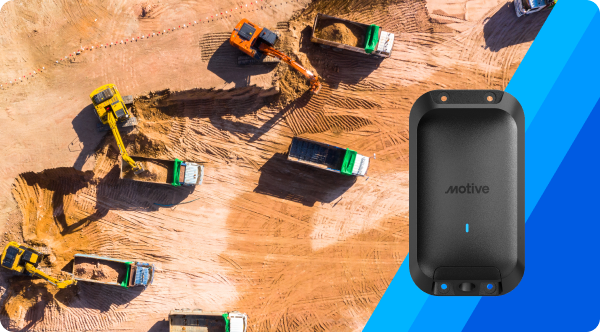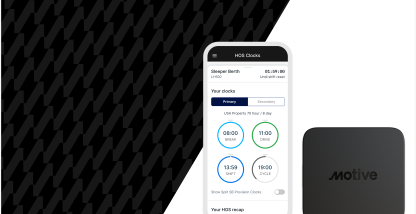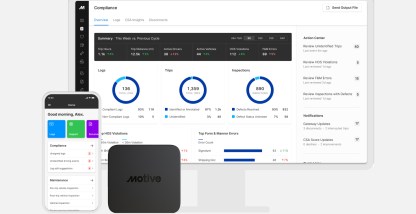You can find pretty much every piece of information on the Internet. Unfortunately, a lot of that information is often wrong.
At least that has been the case with electronic logging devices (ELDs) and the latest ELD mandate passed by the Federal Motor Carrier Safety Administration (FMCSA).
There are so many rumors and ELD myths circulating the web that we decided to create a blog post about it. Do all ELDs cost too much? Can smartphones be used in place of ELDs? Is the ELD mandate just a method of privacy invasion?
This post debunks many ELD myths and presents the primary ELD facts you should know about. Here are the top 10 ELD myths we’ve heard.
ELD myth #1: all ELDs are expensive
One of the most common ELD myths is that ELDs are expensive and cost too much.
Although many existing onboard recorders are expensive, new technologies have reduced the cost considerably. In fact, some ELD manufacturers are now offering extremely convenient and economical packages.
When you consider all of the operational costs in trucking, ELDs are relatively inexpensive. Moreover, the amount of money that ELDs save in terms of lower crash rates, fewer HOS violations and penalties, and time saved managing logs, the devices pay for themselves.
ELD myth #2: ELDs complicate the driving experience
Another very common ELD myth is that ELDs complicate the driving experience. Some anti-ELD parties claim that ELDs also require constant driver interaction on the road.
This could not be further from the truth.
Compared to paper logs, ELDs hardly require driver attention. Drivers only need to select their duty status — on-duty, sleeper berth, or off-duty — and then drive. Apart from this, ELDs don’t require much interaction at all.
Because an ELD connects to the engine of a commercial motor vehicle (CMV), ELDs automatically keep driving time so drivers don’t have to. Once a driver goes on duty the ELD automatically recognizes the difference between driving and stationary events.
ELDs also keep track of possible hours of service violations. Most ELDs provide alerts to inform drivers of any possible upcoming HOS violations. This ensures that drivers always have enough time to reach a safe place and park their CMV.
ELD myth #3: ELDs don’t reduce operational costs
Again, not true.
ELDs can significantly minimize the operational costs of running a trucking business. Here’s how:
- ELDs allow drivers and fleet managers to identify bad driving behaviors that lead to extra expenses, e.g., idling, hard braking, over-acceleration, etc. For instance, it is estimated that for a truck that consumes $70,000 of fuel per year, approximately $5,600 is spent on idling. ELDs will help drivers identify that and save money.
- ELDs help prevent many hours of service violations by automatically tracking the number of hours driven and alerting drivers when they are low on available hours. By avoiding these penalties and fines, ELDs save a lot of money.
- ELDs record driving events down to the second, which allows drivers to gain more time on the road. By comparison, paper logs and some onboard recorders require drivers to round up to the nearest 15 minutes, which cuts into time that could be spent driving.
ELD myth #4: ELDs automatically report HOS violations
This is another ELD myth, not an ELD fact.
Nothing an ELD captures is automatically transmitted to law enforcement agencies or inspectors.
An ELD simply connects to the engine of a vehicle and tracks its movement. However, it does not automatically report HOS violations to authorities. In fact, some ELDs, like Motive’s ELD, preemptively warn drivers before they make violations in the first place.
ELD myth #5: ELDs are just a way to invade privacy
Many drivers are concerned that ELDs will invade their privacy by monitoring their location. But the truth is that only fleet managers at a trucking company will be able to see the location of a vehicle, and only when the engine is running.
In fact, the ELD mandate has privacy provisions intended to make life more peaceful for drivers. For instance, if a driver uses his or her vehicle for personal conveyance, location data is only available to the fleet manager within a 10-mile radius of the driver’s last on-duty movement.
ELD myth #6: ELDs can shut down trucks
The main purpose of an electronic logging device or ELD is to alert drivers of any possible HOS violation. ELDs should not shut down trucks, even if drivers violate HOS rules and drive more than they’re supposed to.
It is up to drivers to find a safe place to stop and park the vehicle.
Note: Remote shutdown technology is still used by some ELD manufacturers, and for the most part it’s very unpopular. The ELD mandate does not require remote shutdown technology, which is why the Motive ELD does not support it. Motive ELDs don’t automatically shut down trucks.
ELD myth #7: ELDs don’t improve safety
The fact is, ELDs improve safety.
In fact, the FMCSA recently released a report which confirms that vehicles with ELDs have a considerably lower crash rate — an 11.7% reduction in accidents and 53% fewer HOS violations were recorded.
Apart from this, it is estimated that the new ELD mandate will save 562 injuries and 26 lives every year.
By complying with the ELD mandate, drivers are not only making their own lives easier and increasing their efficiency, but they may even save the lives of others as well.
ELD myth #8: smartphones are alternates for ELDs
Smartphones can be used when paired up with ELDs. However, smartphones cannot be used in place of ELDs.
As per the ELD mandate, an electronic logging device must connect to the vehicle’s diagnostic port. A smartphone cannot be connected directly to this port without a hardware plugin.
Having said that, smartphones can be used when paired up with an engine-connected ELD. You can download the free Motive mobile app to use in conjunction with the Motive ELD.
ELD myth #9: ELDs don’t benefit drivers
There is a growing misconception that ELDs don’t benefit drivers. But, in fact, ELDs benefit drivers in multiple ways.
Here are 10 different ways ELDs benefit drivers:
- ELDs help drivers focus on driving, instead of worrying about paper logs
- Drivers who use electronic logging devices have a 5.1% lower preventable crash rate
- ELDs help drivers avoid HOS violations and can save money in penalties
- Drivers who use ELDs can improve their CSA score, which makes them more desirable and employable
- ELDs are also associated with insurance benefits. As mentioned earlier, vehicles with ELDs have an 11.6% lower crash rate, which makes them a safer option. Many insurance companies, such as Sentry, are now offering better insurance rates for vehicles that use ELDs
- IFTA reporting is a hassle for drivers and fleet managers. An ELD device can automatically calculate the distance your vehicles travel in each jurisdiction to reduce the administrative burden of collecting state-by-state mileage
- ELDs make it easier for drivers to quickly get through roadside inspections. It allows them to get back on the road fast, which is crucial in minimizing costs and maximizing profits
- ELDs automatically keep track of the number of hours driven. Whenever a possible HOS violation is looming, ELDs alert drivers prior so they can avoid violations and fines
- An ELD paired with a smartphone app can help drivers easily communicate with other drivers and fleet managers on the go. Check out Motive’s messaging feature for more information on streamlining communication
- GPS location tracking reduces the number of check calls drivers have to answer from dispatch. When a customer calls dispatch for a delivery status update, the dispatcher can quickly inform the customer without having to bother the driver
ELD myth #10: drivers hate ELDs
While there are still a few naysayers who claim that all drivers hate ELDs, we have video evidence that says otherwise.
Derwin Johnson has been a commercial truck driver for over 10 years. He uses Motive electronic logs. See what he has to say about them!
Bottom line
Don’t believe everything you read on the Internet. There are dozens of benefits ELDs provide, and one shouldn’t believe the ELD myths.
For more information about the ELD mandate, download our free guide — The Fleet Guide to ELD Mandate.
And if you have any questions about the ELD mandate or how Motive can help you become ELD compliant, please contact our support team.








